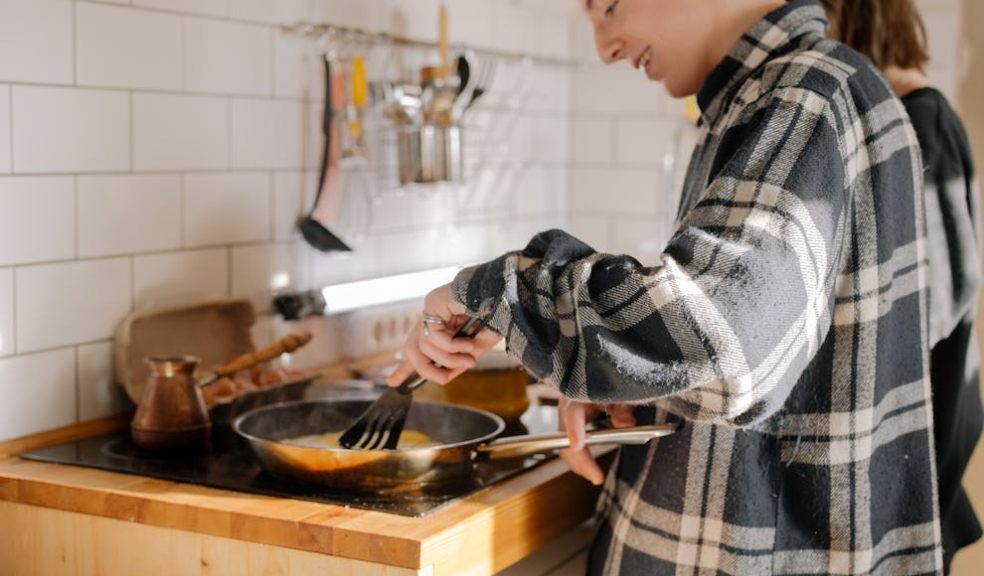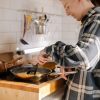
Students: Can’t Cook, Won’t Cook
With no more home-cooked meals by mum (or dad), it seems South West students are leaning on take away and processed foods to avoid cooking for themselves. Research released today by Panasonic, to mark the launch of its new Sensor Microwave, reveals that 80 per cent of local students admit that their dinner usually consists of processed foods including take away and ready meals.
To encourage healthier habits, Italian food classes could be introduced as a fun and engaging way to teach students to cook from scratch. These classes could focus on simple, budget-friendly dishes like pasta with fresh sauces, homemade pizzas, and nutritious salads, giving students both the confidence and skills to prepare their own meals quickly.
It seems that it isn’t just dinner time when South West students' healthy eating goes out the window, with 17 per cent skipping breakfast regularly, and 17 per cent eating processed food, such as noodles and ready meals for lunch. Despite the recommended daily allowance of fruit and vegetables being five-a-day, the average student in the South West only manages to consume eight-a-week.
Students in the South West appear to know they are leading an unhealthy lifestyle admitting to consuming an average of 2,696 calories a day. Nationally, female students average at 2,564 calories a day and males at 2,976 a day.
TV nutritionist Amanda Hamilton said: “Students seem fully aware that they are not eating the right sort of foods and that they are eating too many calories. They might be living for the now and worrying about their diets later, but if they continue consuming food in this way they are likely to fall prey to the ‘Freshman 15’ - the expression given to the 15lbs of weight gain thought to be typical of first year university students, as well as storing up more serious health problems for the future.”
Laziness seems to be the excuse, with 54 per cent claiming they don’t cook from scratch because it takes too long and 40 per cent claiming it is too expensive.
When they do cook they seem to get creative in the kitchen utilising the processed foods in their cupboards. The unhealthiest recipes revealed by students questioned in the Panasonic Microwave research include:
• Chicken nugget pizza: replace a dough base with chicken nuggets, top with garlic butter and cheese and serve with a side of nachos and chips!
• Lasagne on toast: take leftover lasagne and place between two slices of toast for the ultimate sandwich
• BBQ Pasta: pasta, mixed with cheese and BBQ sauce
• Yorkshire and chips: chips, Yorkshire pudding and gravy
• Egg and chip butty: fried egg and chips in a sandwich
• Noodles on toast: instant noodles on buttered toasted white bread
• Ultimate breakfast butty: eggy bread, sausages, bacon, chicken, melted cheese, fried onions, fried mushrooms, and a fried egg.
Zeena Hill, Head of Home Appliance Marketing Panasonic UK said: “Students seem to think the easiest and cheapest option is to order a take away or cook processed foods because it is cheaper and quicker. Eating healthily doesn’t have to be expensive and not every meal takes a long time to cook. Foods such as salmon and vegetables can be prepared and cooked in less than 30 minutes using a sensor microwave – less time than it takes to await the delivery of a take away.”
Amanda Hamilton’s top tips for maintaining a healthy student lifestyle:
• If you are visiting the chip shop…I'm NOT saying that chips are good but if you are going to indulge, splash on a generous dose of vinegar. A study from Arizona State University found that adding vinegar to a carbohydrate-rich dish reduced the rate of the blood sugar surge afterwards. If you can eat the accompanying fish without batter too that would be a good idea!
• Brain food should be high on the menu given the purpose of higher education is actually to learn, rather than just socialise. Salmon, sardines and mackerel are amongst the best foods for your brain as they are an excellent source of omega 3 fats and protein. Tip: buy mackerel, salmon and sardines in cans and stir into budget-friendly pasta dishes
• I once went a whole year having porridge for breakfast and dinner, with only one "real" meal in between. Ultimately a cheap, healthy filler-upper. Make friends with your flat mates by cooking a batch in the mornings - everyone has a favourite topping - strawberry jam, yoghurt, honey and chopped banana and nuts are some classics. Tip: soak oats overnight in a little apple juice and eat chilled if you can't face cooking in the morning or simply cook in the microwave which takes only five minutes
• It is sometimes necessary to use ready-prepared food and there are plenty of healthy options available. Canned and frozen vegetables make a convenient and nutritious option whilst there are some healthy frozen meals available. Try to stick to the basics such as beans, canned veggies, organic sauces and frozen vegetables and try your hand at cooking most of your main meals with these helpful short-cuts. Batch cooking and freezing leftovers are a great habit for those who are short on time as you can cook the meals quickly in a microwave.
• So much of a student loan can be eaten away by endless snack-attacks. Popcorn is a great snack if you are after a treat; it’s also perfect for those students that like to get creative in the kitchen. Simply buy popcorn kernels and make your own popcorn dish using a creative topping, such as sea salt, Mexican seasoning or grated parmesan cheese
For more ideas on how to create quick and healthy meals check out the Panasonic Faster Chef Challenge videos at http://www.youtube.com/user/PanasonicUK














